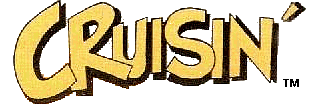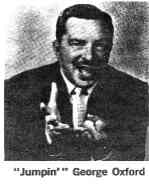
It's 1955 in the CRUISIN' series and popular music is changing radically. The moon/June/spoon generation is giving way to a noisier, brasher rock 'n' roll tribe. The message in Billboard magazine this year is "Keep pop alive in '55" and adults are calling the new music a teen-age fad, but there is no stopping it. 1955 is, after all, the year of "The Blackboard Jungle" and the song from that film, Bill Haley's Rock Around the Clock.
One of the men helping shape the burgeoning rock revolution was "Jumpin'" George Oxford, a mild-mannered white Southern family man who when facing a radio microphone turned into a dapper, jive-taling rhythm and blues disc jockey, introducing records by black artists for a station beamed to the black market, KSAN in San Fransisco.
In 1955, Old "Jumpin'" was one of radio's pros, with 18 years of radio experience. He was heard on KSAN morning, afternoon and night, 43 hours a week. (Today most rock jocks work only a three-hour shift, six days a week.) This repeated exposure, coupled with a growing white R&B audience, made "Jumpin'" George Oxford one of the most effective radio personalities of the time.
His slogan for the year (you'll hear it here) - a variation on the futile plea in Billboard, "Be alive in '55!"
The music was alive that year. Mitch Miller and his chorus may have been crashing through The Yellow Rose of Texas, while Bill Hayes crooned "The Balld of Davy Crockett," but the artists attracting teen-agers were singing about black denim trousers and motorcycle boots. Snooky Lanson, Russell Arms, Gizelle MacKenzie and Dorothy Collins began to experience difficulty interpreting R&B for "Your Hit Parade." And in Nashville, a former truck driver called Presley was named Outstanding New Country Artist of the Year and then signed a record contract with RCA.
1955 was a year of non-musical changes as well. The anti-communist paranoia created almost single-handedly by Sen. Joe McCarthy was waning. President Eisenhower ended U.S. occupation of Germany. The Supreme Court gave local authorities the task of integrating public schools. Fifteen-million workers came together as the A F of L and the CIO merged. School kids formed lines to try a new polio vaccine invented by Jonas Salk.
On the lighter side in '55, the Oscar for the best film song went to Love Is a Many Splendored Thing (the movie of the year was "Marty")...slumber parties were popular, and so were shoe taps and strapless prom dresses with lots of crinoline...Mary Martin was "Peter Pan"...and after winning six of the last seven World Series, the Yankees were beaten by the Brooklyn Dodgers.
In R&B (and rock 'n' roll) meanwhile, there'd been a lyrical breakthrough. Now there was more honesty, a frankness seldom, if ever, heard on the radio before. An example was Ray Charles' gospel-styled blues, I Got A Woman: "I've got a woman/Way across town/She's good to me/She saves her lovin'/Early in the morn'/Just for me..."
Even more to the point was Hank Ballard's openly candid Annie Had A Baby, a not-so-subtle but nonetheless good-natured follow-up to his earlier record, Work With Me Annie. The Annie songs, along with such tunes as I Want A Bowlegged Woman, Sixty-Minute Man and Baby, Let Me Bang Your Box (the "box" being a piano), often were banned from the airwaves. KSAN ignored such restrictions. And Ballard, who later would write Finger-Poppin' Time and The Twist, became one of the most popular artists on the early R&R circuit.
Throughout the middle 50's, "cover records" were much in style. They were also much criticized, by the purists at least, as whenever a black artist recorded what seemed to be hit material, some white performer would "cover" the song, cleaning it up for the still-dominant adult market, thereby selling the most records. Eventually a demand for the originals would kill "covers," but in 1955 it was not unusual when the McGuire Sisters (one of Arthur Godfrey's groups) "covered" the Moonglows' version of Sincerely, a song whose authorship was credited to one of R&B's biggest promoters, disc jockey Alan Freed.
One of the most interesting stories told about the R&B Group Era concerns Otis Williams and the Charms, who weren't a group at all, but merely playing softball across the street from King Records in Cincinnati when King president Sidney Natahan needed some singers and called them in for an audition. The result: Hearts of Stone, which became the year's first #1 song on the R&B charts...when it was "covered" by the Fontane Sisters.
Little Walter was more lyrical than most other blues singers working the Chicago bars in the early and middle Fifties. (Often he worked as Muddy Waters' harmonica player.) Willie Dixon's My Babe was #1 in R&B in April and was recorded for two of the early movers in rock 'n' roll, Phil and Leopnard Chess, who released it on their Checker label.
 As the songs on this CRUISIN' record show, R&B was a national phenomenon, with singers and groups coming from nearly all metropolitan areas. Representing Los Angeles (on the independent Dootone label): one of the many "bird groups," The Penguins. Their best-known song, Earth Angel, written by their lead singer Jesse Belvin, was in the Top 10 the first 15 weeks of the year...and was "covered" by the Crew Cuts.
As the songs on this CRUISIN' record show, R&B was a national phenomenon, with singers and groups coming from nearly all metropolitan areas. Representing Los Angeles (on the independent Dootone label): one of the many "bird groups," The Penguins. Their best-known song, Earth Angel, written by their lead singer Jesse Belvin, was in the Top 10 the first 15 weeks of the year...and was "covered" by the Crew Cuts.
No anthology of music from the '50's would be complete without a song from the influential Chuck Berry, whose wit, imagination and musical pzazz probably qualify him as The Major Figure of rock. (He is, for a small example, the only songwriter whose tunes have been recorded by The Big Three: Elvis, the Beatles and the Rolling Stones.) Maybelline was the single that took Chuck from the
R&B to the pop record charts and was the first in a long line of venerable hits.
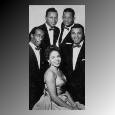 After the Penguins began to slip, their manager Buck Ram concentrated on the second black vocal group in his Los Angeles stable, the Platters. They'd made their disc debut for King in 1953, then switched to Mercury in 1955 and released Only You, a song that remained on the charts for 22 weeks. From that moment until 1960 - largely thanks to the smooth vocals of tenor Tony Williams - the Platters were a Top Ten act.
After the Penguins began to slip, their manager Buck Ram concentrated on the second black vocal group in his Los Angeles stable, the Platters. They'd made their disc debut for King in 1953, then switched to Mercury in 1955 and released Only You, a song that remained on the charts for 22 weeks. From that moment until 1960 - largely thanks to the smooth vocals of tenor Tony Williams - the Platters were a Top Ten act.
Another titan of early rock was Antoine (Fats) Domino, a rollicking, whiskey-voiced piano player from New Orleans whose records (for Imperial) were above all else, simple, fun and danceable. His hit in 1955, Ain't It A Shame, was a successful "cover" for one of the leading musical homogenizers of
the period, Pat Boone.
(Footnote: Maybelline, Only You and Ain't It A Shame - all three - first appeared on the charts the same week, in November.)
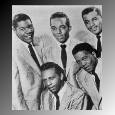 Another of the first generation vocal groups was the Nutmegs, representing New York in thi CRUISIN' volume. Among collectors today, Nutmegs records (on Herald) are among the most sought-after in the "doo-wop" field. (A name that comes from the vocal sounds many of the groups made.) Story Untold is another in music's long history of lyric tributes to unrequited love. "Here in my heart," the Nutmegs sang, "is a story untold."
Another of the first generation vocal groups was the Nutmegs, representing New York in thi CRUISIN' volume. Among collectors today, Nutmegs records (on Herald) are among the most sought-after in the "doo-wop" field. (A name that comes from the vocal sounds many of the groups made.) Story Untold is another in music's long history of lyric tributes to unrequited love. "Here in my heart," the Nutmegs sang, "is a story untold."
If Chuck Berry is The Major Figure, probably Bo Diddley (real name: Ellis McDaniels) is the musician who is Mr. Runner-Up. It was with a song of delightful braggadocio, named for himself, Bo Diddley, that he established his much-copied shave-and-a-haircut-two-bits rhythm style and joined Chuck as one of the early rock 'n' roll humorists.
Closing the "Jumpin'" George Oxford KSAN show is Johnny Ace's sentimental Pledging My Love, a record that was R&B's top song 10 weeks in a row. Johnny also completes the national R&B circuit we've made, recording for Don Robey's Duke label in Houston. (Robey had also written the song.)
Nationwide, whenever a radio could be heard, the rock revolution was on. "Tutti frutti," sang Little Richard in 1955, "aw rootie!"
- Jerry Hopkins.
CRUISIN' THE FIFTIES & SIXTIES: A History of Rock and Roll Radio. Conceived and recreated by: Ron Jacobs/Production and Research: Ellen Johnson and Jere Alan Brian/Engineering: John Horton/Art Direction: Paul Gruwell/Cover Art: Mike Royer/All selections are the original performances as released on the following labels:Atlantic: Ray Charles/Chess: Chuck Berry, Bo Diddley, Little Walter, Moonglows/Deluxe: Charms/Dootone Penguins/Duke: Johnny Ace/Federal: Hank Ballard & The Midnighters/Imperial: Fats Domino/Mercury: Buddy Morrow, Platters/Special thanks to: Willis Duff, KSAN (FM) Radio. Produced by Increase Records, a division of Watermark, Inc., Los Angeles, California.
© 1970 Increase Records.
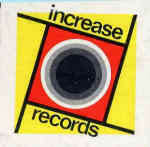
Back to the

index.
